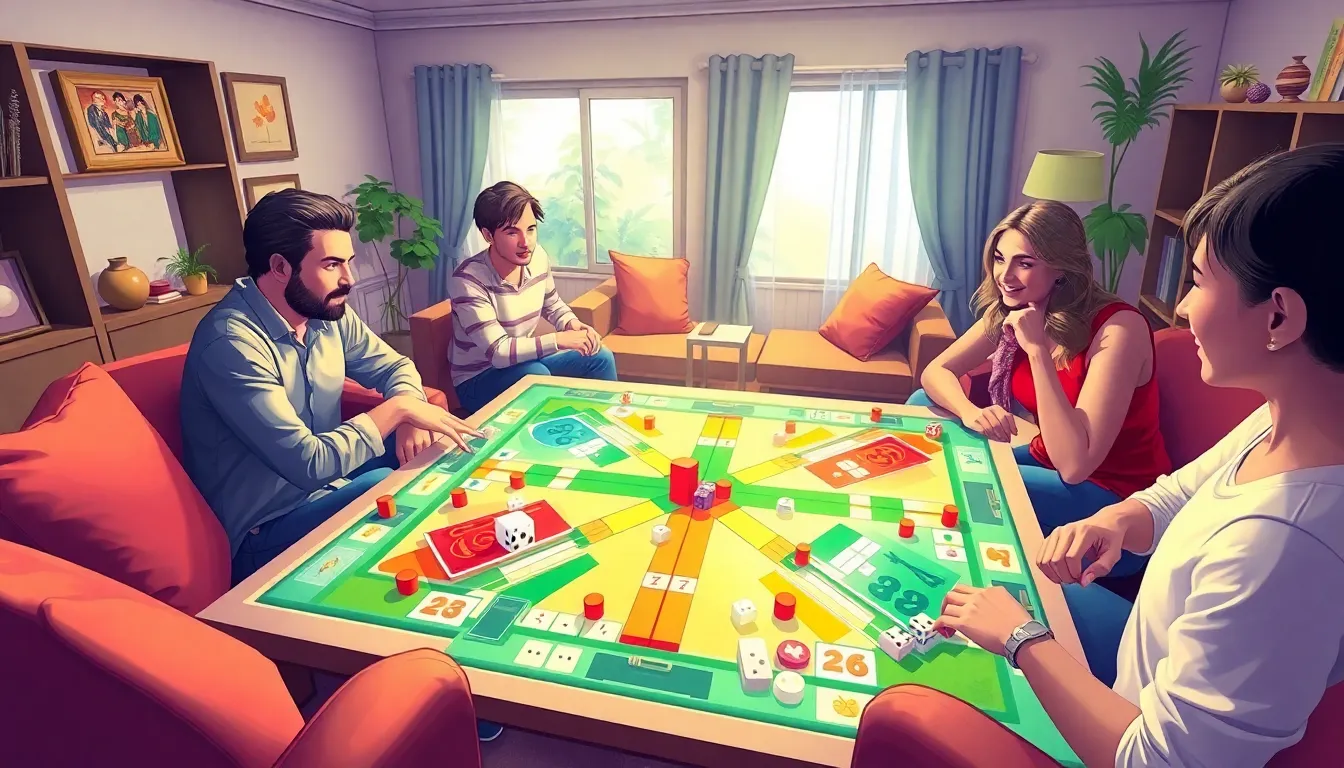In a world where board games have gone digital, Ludo reigns supreme as a classic favorite that brings friends and families together. But what makes a Ludo game truly shine? It’s not just the colorful pieces or the thrill of rolling the dice; it’s the magic of a top-notch game development company behind it.
Imagine a team of wizards—armed with code instead of wands—crafting a Ludo experience that’s as engaging as it is addictive. These developers blend creativity with technology to create vibrant graphics, smooth gameplay, and features that keep players coming back for more. Whether it’s a fierce competition among friends or a casual game night, a stellar Ludo game can turn any dull moment into an epic showdown. So, let’s dive into what sets the best Ludo game development companies apart from the rest and why they’re the ultimate game-changers in the industry.
Table of Contents
ToggleOverview of Ludo Game Development
Ludo game development combines creativity and technology to adapt a classic board game for digital platforms. Developers use innovative design principles to create visually appealing environments and engaging gameplay experiences. Unique features, such as multiplayer options and social sharing, elevate player interaction and enjoyment.
Quality is a key factor in determining player satisfaction. High-quality graphics contribute to the immersive experience, while smooth animations enhance gameplay fluidity. Game mechanics, like dice rolling and movement algorithms, require careful programming to ensure fairness and unpredictability.
Developers focus on user experience by implementing intuitive interfaces. This consideration allows players of all ages to understand the game quickly. Analytics tools can track player behavior, providing insights for ongoing improvements and updates.
Mobile compatibility is crucial, as many players prefer to play on smartphones and tablets. Cross-platform functionality ensures that friends can compete regardless of their device choice.
Security also plays a vital role in Ludo game development. Protecting user data and maintaining a fair gaming environment helps build trust among players. Companies must implement robust anti-cheating mechanisms to keep the game enjoyable for everyone.
Successful Ludo game development hinges on a blend of creativity, technology, and player-centric design. Applying these principles leads to a truly captivating gaming experience appreciated by a wide audience.
Key Features of Ludo Games

Ludo games integrate several essential features that enhance player engagement and enjoyment. The following sections detail key aspects of game mechanics and user interface design in digital Ludo.
Game Mechanics
Game mechanics revolve around the rules that define how players interact with Ludo. Players roll dice to move their pieces around the board, aiming to reach the home area first. Multiplayer options allow friends and family to compete, fostering social interaction. Unique power-ups may feature, offering strategic advantages during gameplay. Turn-based play requires players to plan their moves carefully, adding depth to the gaming experience. Implementing a safe and secure matchmaking system ensures fair competition among players. Overall, well-designed mechanics keep players entertained while promoting a sense of challenge.
User Interface Design
User interface design plays a crucial role in Ludo games, influencing how players navigate the game. Clear and intuitive menus help players find game modes easily. Colorful graphics attract attention, providing a visually stimulating environment. Animations enrich the gaming experience, making each move exciting. Interactive elements respond to player actions, enhancing engagement. Mobile compatibility ensures accessibility, allowing players to enjoy Ludo on various devices. Simple, user-friendly layouts cater to both novice and experienced players, making the game enjoyable for everyone. Exceptional user interface design contributes significantly to overall satisfaction.
Choosing the Right Ludo Game Development Company
Selecting the ideal Ludo game development company requires attention to several key factors. Focusing on experience and expertise ensures development teams understand the intricacies of game design and user engagement.
Experience and Expertise
Experience directly impacts the quality of game development. Companies that specialize in Ludo games typically possess a proven track record of delivering successful projects. Expertise in mobile game design enhances the ability to create compelling gameplay and appealing visuals. Developers with knowledge of current trends can integrate innovative features that resonate with players. A skilled team understands the importance of maintaining user engagement through captivating mechanics. Assessing client testimonials can provide insights into a company’s reputation and reliability.
Portfolio and Case Studies
Evaluate the portfolio of potential development companies to gauge their capabilities. A strong portfolio showcases diverse Ludo game designs, highlighting creativity and technical skills. Reviewing case studies sheds light on the challenges faced and solutions implemented by the development team. Successful projects often indicate a company’s ability to meet deadlines while adhering to client objectives. Companies that share their success stories demonstrate confidence in their work. Examining the variety of platforms supported can ensure compatibility with different devices, enhancing the gaming experience.
Popular Technologies Used in Ludo Game Development
Developers employ various technologies to create Ludo games that resonate with players. Unity stands out as a leading game engine, facilitating smooth gameplay and high-quality graphics. Android and iOS platforms are pivotal in reaching a broad audience, enabling players to enjoy Ludo on smartphones and tablets.
Cross-platform development frameworks like React Native and Flutter allow seamless experiences across devices. These frameworks streamline coding processes, enhancing efficiency in game design. Backend services such as Firebase provide real-time database solutions, supporting multiplayer functionalities.
Incorporating artificial intelligence greatly enriches gameplay experiences. AI can enhance opponent strategies and provide personalized challenges, increasing player engagement. Additionally, using augmented reality (AR) technology can make gameplay immersive, bringing a fresh twist to traditional Ludo.
Blockchain technology offers enhanced security and transparency, particularly in in-game transactions. This approach protects user data and fortifies the integrity of competitive play. Utilizing analytics tools helps developers understand user behavior and preferences, guiding future updates and features.
Game monetization methods employ tools like AdMob for in-game advertising or in-app purchases for added gameplay enhancements. Integrating social media share functionalities fosters community engagement and encourages organic growth.
A combination of game engines, frameworks, backend services, and emerging technologies shapes the landscape of Ludo game development. Prioritizing these technologies can significantly elevate user experience and satisfaction.
The Development Process Explained
Creating a successful Ludo game involves a multi-step development process, ensuring engaging gameplay and satisfying user experiences.
Conceptualization and Planning
First, developers identify the core ideas behind the Ludo game. They brainstorm innovative features that retain the game’s essence while appealing to modern players. Designers create outlines for gameplay mechanics, player interactions, and visual aesthetics. In this stage, developers also assess target audiences and market trends to align their strategies. Conducting thorough research on competitor games helps in understanding gaps in the market. Based on this research, developers prioritize essential elements that elevate the user experience. Ultimately, detailed documentation guides the project, facilitating clear communication among all team members throughout the development process.
Testing and Launching
Testing represents a critical phase in Ludo game development. Developers conduct rigorous quality assurance to identify bugs and glitches across different devices. Feedback from early users plays a vital role in tuning gameplay dynamics and enhancing user interfaces. After addressing potential issues, developers prepare for the official launch. This preparation includes marketing strategies to generate excitement. Ensuring a smooth launch involves coordinating promotional campaigns and optimizing app store listings for visibility. Emphasizing user engagement during the launch helps capture initial player interest and retains it through ongoing updates and support.
The landscape of Ludo game development is vibrant and ever-evolving. Companies that excel in this field combine creativity with cutting-edge technology to deliver captivating experiences. By focusing on high-quality graphics intuitive user interfaces and engaging gameplay mechanics they ensure players remain invested.
Choosing the right development partner is crucial for success. A strong portfolio and proven track record can make all the difference in creating a Ludo game that stands out. As technology continues to advance the potential for innovation in Ludo game development remains limitless. Embracing these advancements will not only enhance gameplay but also foster a loyal player community.





